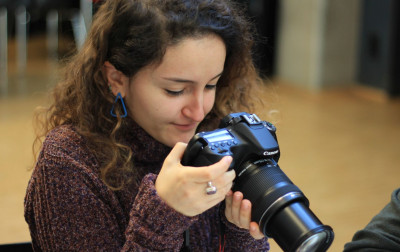International atmosphere

Young people from Turkey, Poland, Romania and Germany met together in Münster, Germany to learn about DSLR cameras. The training course took place between 14th and 22nd of February 2016. In the atmosphere of international exchange, youth were producing videos about health issues.
It was already the second time, when the youth from different countries met in Münster, Germany in the framework of the Face Up project. This time they were learning how to use the Digital Single Lens Reflex camera. ‘I had fun. I made friends. I learnt a lot about taking photos and recording videos. We even created our own short movie about fast and slow life. I enjoyed it a lot, especially the topic. I will buy a camera and thanks to this training, I will know how to use it. I will discover the world through photography.’ admits Elif Ecem Uysal – a participant from Turkey.
20 young people spent one week together during which they were discussing the topic of video making. It all started with the theory. International media trainers explained them all the camera functions and showed how to follow the rules of the good picture composition. As Nora Staege – a participant from Germany said: ‘I really like this week of training course. I love to be in an international atmosphere. I really benefit from it. I learnt a lot, how to use the cameras, since I am an absolute beginner. I think that I got an idea of the usage of DSLR. I will practice it again in the future and I hope I to improve it.’
Participants had the chance not only to learn about the DSLR but also to try it. Their main task was to produce a video on the topic of health issues. Together with their teamers, they made a complex research and decided to focus on the aspect of fast food, vegetarianism and veganism. Amalia Pais from Romania admitted that exactly this topic is one of her favourites: ‘During this week I had a great learning by doing experience. I am really happy that I had such a good team. We were all very creative. I am satisfied, how our short movie turned out. When I heard that the topic of this media camp is health issues, I was impressed and happy because this is exactly what I am interested in.’
In the end of the week participants provided the organisers with 2 video products: one short movie about the fast, slow food and the video report about different types of diets. Deep research about the topic, filming, hours of discussions and interviews with specialists gave the youth possibility to gain the new media skills and new knowledge about the topic. All the products were presented during the final live debate where the guests, speakers and participants themselves had the chance to talk about the food industry and their impressions from the training course.
This Face Up media camp combined workshops with additional activities such as intercultural evening, sightseeing and spending time together in the evenings and during the meals. It was the opportunity to get to know each other’s culture, exchange experiences and spend time together. One of the participants from Poland, Grzegorz Konposki, underlines how import this aspect is: ‘That was not my first media camp but I can safely say that each time media camp is better organised, more interesting and the participants are getting more experienced. I think that it is a great opportunity for them to gain new skills and be better in what they love, which are filming, being creative and having a good time together.’
The training course was organised under the Face Up project by European Youth4Media Network e.V. in the cooperation with AKO Bürgerhaus Bennohaus, German Romanian Foundation and YouthART.
The project is supported by the Erasmus + of European Union and aims to give the youth a possibility to acquire skills and knowledge how to engage youth in creative community, social media and to encourage active EU citizenship. The project focalizes on Rio+20 commitments especially how the EU will contribute to pursue Sustainable Development Goals and how to downsize the gap between citizens and their EU institutions.
More about the project and its previous actions here: http://youth4med.com/?cat=15
Daria Jaranowska










